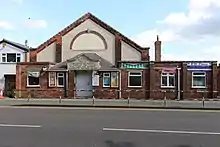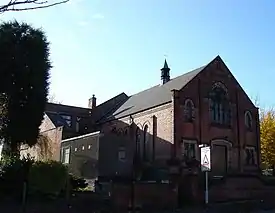William Herbert Higginbottom
William Herbert Higginbottom JP (23 March 1868 – 6 December 1929) was an architect based in Nottingham.
Life
He was born on 23 March 1868 in Leeds to Anthony Higginbottom (1842–1895) and Elizabeth Ackroyd (1844–1913). When he was one year of age, his family moved to Arnold, Nottingham, where his father became the headmaster of the British School.[1]
He married Elizabeth Spencer (1869–1924) on 25 January 1897 at Redcliffe Road Methodist Chapel, Nottingham, and they had the following children:
- Hilda Margaret Higginbottom (1899–1973)
- William Herbert Higginbottom (1899–1899)
- (Anthony) John Higginbottom (1902–1972) LRIBA also an architect
- Elizabeth May Higginbottom (1904–1904)
- Elizabeth Higginbottom (1906–1972)
He died on 6 December 1929 and left an estate valued at £2882 16s 2d.[2] (equivalent to £186,400 in 2021).[3]
Career
He attended the Nottingham School of Art.[4]
For a time he worked from King John's Chambers in Nottingham. In 1905 he moved to an office at 16 George Street, Nottingham[5] but in 1906 he moved to 2 Friar Yard, Friar Lane, Nottingham.[6] along with Hedley John Price.
After qualifying as an architect Higginbottom designed many of the important buildings in Arnold.
He was a local councillor on Arnold Urban District Council and chairman from 1911 to 1913. He was a member of Nottinghamshire County Council, for the Bestwood Park Division, where he worked on the old age pension and highways committees.[1]
Buildings
.jpg.webp)

- St Matthias' Day Schools, Carlton Road, Sneinton, Nottingham 1895 (enlargement)[7]
- Stapleford Schools[1] 1896
- Sir John Robinson’s Almshouses, Daybrook 1899[8]
- Wesleyan Chapel, Arnold[1] 1900
- Carlton Methodist Church, 1903[9]
- Five semi-detached houses, 44-62 Meadow Road, Beeston
- United Methodist Church, Sneinton Boulevard, Sneinton 1904-05[10]
- The Carnegie Library, Arnold[1] 1906[11]
- Calverton Methodist Church, 1907[12]
- Cross Street Baptist Church[1] 1909[13]
- St Albans Picturedrome, Arnold 1912[14] (with George Francis Grimwood)
- Daybrook Baptist Church,[1] 1912
- Ruddington Village Hall[1] 1912-13
- Victoria Picture Palace, 49 Station Road, Carlton[1] 1912-13
- Empress Cinema, Arnold[1] 1913
- Mission Church at Daybrook[1]
- War Memorial Cross, Beeston[1] 1921[15]
- War Memorial in Arnot Hill Park, Arnold[1] 1922
- Chilwell Memorial Institute 1924[1]
- Park House Carlton[1]
- Warehouses on Plumptre Street, Nottingham
- Sunday School, Ebenezer United Methodist Chapel, Arnold 1929[16]
References
- "W H Higginbottom and James Shirtcliff". Arnold Local History Group. Retrieved 28 September 2014.
- "Index of Wills and Administrations, 1858–1995" (1930). England & Wales, National Probate Calendar, p. 182. The National Archives.
- UK Retail Price Index inflation figures are based on data from Clark, Gregory (2017). "The Annual RPI and Average Earnings for Britain, 1209 to Present (New Series)". MeasuringWorth. Retrieved 11 June 2022.
- "Nottingham School of Art List of Awards". Nottingham Evening Post. England. 30 August 1888. Retrieved 15 April 2017 – via British Newspaper Archive.
- "W.H. Higginbottom". Nottingham Journal. England. 18 January 1905. Retrieved 25 June 2020 – via British Newspaper Archive.
- "Notice of Removal". Nottingham Journal. England. 26 March 1906. Retrieved 25 June 2020 – via British Newspaper Archive.
- "St Matthias Day Schools". Nottingham Evening Post. England. 16 April 1895. Retrieved 25 June 2020 – via British Newspaper Archive.
- "The Sandford Robinson Almshouses". Nottingham Journal. England. 4 October 1899. Retrieved 15 April 2017 – via British Newspaper Archive.
- "Methodism at Carlton. New Chapel Opened". Nottingham Evening Post. England. 13 August 1903. Retrieved 15 April 2017 – via British Newspaper Archive.
- "New Methodist Church at Sneinton". Nottingham Evening Post. England. 16 June 1904. Retrieved 15 April 2017 – via British Newspaper Archive.
- "Carnegie Library at Arnold". Nottingham Evening Post. England. 27 October 1906. Retrieved 15 April 2017 – via British Newspaper Archive.
- "The foundation stones of a new Primitive Methodist Chapel at Calverton…". Nottingham Journal. England. 8 April 1907. Retrieved 15 April 2017 – via British Newspaper Archive.
- "New Baptist Chapel at Arnold". Nottingham Evening Post. England. 18 February 1909. Retrieved 15 April 2017 – via British Newspaper Archive.
- "Bonington Theatre, 98 Nottingham Road, Arnold, NG5 6LF". Cinema Treasures. Cinema Treasures. Retrieved 26 June 2020.
- "Beeston's Heroes. Celtic Memorial Cross Unveiled". Beeston Gazette and Echo. England. 28 May 1921. Retrieved 25 June 2020 – via British Newspaper Archive.
- "Arnold Stone Laying". West Bridgford Times & Echo. England. 21 June 1929. Retrieved 25 June 2020 – via British Newspaper Archive.
